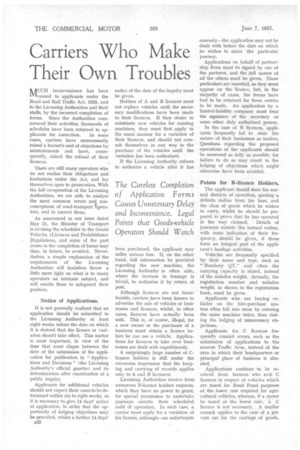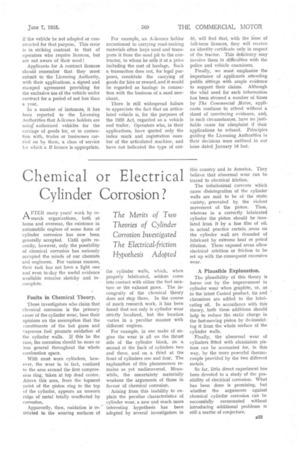Carriers Who Make Their Own Troubles
Page 36

Page 37

If you've noticed an error in this article please click here to report it so we can fix it.
1‘AUCH inconvenience has been "Icaused to applicants under the Road and Rail Traffic Act, 1933, and to the Licensing Authorities and their staffs, by the incorrect completion of forms. Since the Authorities commenced their activities, thousands of schedules have been returned to ap plicants for correction. In some cases, carriers have unnecessarily raised a hornet's nest of objections by misstatements and have, consequently, risked the refusal of their licen c es .
There are still many operators who do not realize their obligations and limitations under the Act, and lay themselves open to prosecution. With the full co-operation of the Licensing Authorities, we are able to analyse the most common errors and misconceptions of road-transport !operators, and to correct them.
As announced in our issue dated May 31, the Minister of Transport is revising the schedules to the Goods Vehicles (Licences and Prohibitions) Regulations, and some of the past errors in the completion of forms may thus, in future, be avoided. Nevertheless, a simple explanation of the requirements of the Licensing Authorities will doubtless throw a little more light on what is to many operators an intricate subject, and will enable them to safeguard their position.
Notice of Applications.
It is not generally realized that an application should be submitted to the Licensing Authority at least eight weeks before the date on which it is desired that the licence or variation should take effect. This matter is most important, in view of the time that must elapse between the date of the submission of the application for publication in "Applications and Decisions " (the Licensing Authority's official gazette) and its determination after examination at a public inquiry.
Applicants for additional vehicles should not expect their cases to be determined within six to eight weeks, as it is necessary to give 14 days' notice of application, in order that the opportunity of lodging objections may be provided, whilst a further 14 days' notice of the date of the inquiry must be given.
Holders of A and B licences must not replace vehicles until the necessary modifications have been made to their licences. If they desire to substitute new vehicles for existing machines, they must first apply in the usual manner for a variation of their licences. and should not commit themselves in any way to the purchase of the vehicles until the variation has been authorized.
If the Licensing Authority refuses to authorize a vehicle after it has been purchased, the applicant may suffer serious loss. If, on the other hand, full information be provided regarding the new machine, the Licensing Authority is often able, where the increase in tonnage is trivial, to authorize it by return of post.
Although licences are not transferable, carriers have been known to advertise the sale of vehicles or businesses and licences, whilst, in other cases, licences have actually been sold. This is, of course, illegal, for a new owner or the purchaser of a business must obtain a licence before he can use a vehicle. Applications for licences to take over businesses are dealt with expeditiously.
A surprisingly large number of Clicence holders is still under the erroneous impression that the keeping and carrying of records applies only to A and B licensees.
Licensing Authorities receive from numerous B-licence holders requests, which they have no power to grant, for special permission to undertake journeys outside their scheduled
radii of operation. In such case, a carrier must apply. for a variation of his licenCe, although—an unfortunate
anomaly—the application may not be dealt with before the date on which he wishes to make the particular journey.
Applications on behalf of partnership firms must be signed by one of the partners, and the full names of all the others must be given. These particulars are essential, as they must appear on the licence, but, in the majority of cases, the forms have had to be returned for these entries to be made. An application by a limited-liability company must bear the signature of the secretary or some other duly authorized person.
In the case of B licences, applicants frequently fail to state the nature of their businesses as traders. Questions regarding the proposed operations of the applicants should be answered as fully as possible, for failure to do so may result in the lodging of objections which might otherwise have been avoided.
Points for B-licence Holders.
The applicant should state his normal districts of operation, quoting a definite radius from his base, and the class of goods which he wishes to carry, whilst he should be prepared to prove that he has operated in the way claimed. Details of journeys outside the normal radius, with some indication of their frequency, should be given, if these form an integral part of the applicant's haulage activities.
Vehicles are frequently specified by their name and type, such as " Rosebery QT," and often the carrying capacity is stated, instead of the unladen weight. Actually, the registration number and unladen weight, as shown in the registration book, must be given, Applicants who are buying vehicles on the hire-purchase system often fall into error by entering the same machine twice, thus risking the lodging of unnecessary objections.
Applicants for C licences frequently commit errors, such as the submission of applications to the nearest Traffic Area, instead of the area in which their headquarters or principal place of business is situated.
Applications contimie to be received from farmers who seek C licences in respect of vehicles which are taxed for Road Fund purposes at the lower rate required for agricultural vehicles, whereas, if a motor be taxed at the lower rate, a C licence is not necessary. A similar remark applies to the case of .a
vate car for the carriage of goods, if the vehicle be not adapted or constructed for that purpose. This error is in striking contrast to that of operators who require licences, but are not aware of their need!
Applicants for A contract licences should remember that they must submit to the Licensing Authority, with their applications, a signed and stamped agreement providing for the exclusive use of the vehicle under contract for a period of not less than a year.
In a number of instances, it has been reported to the Licensing Authorities that A-licence holders are using authorized vehicles for the carriage of goods for, or in connection with, trades or businesses carried on by them, a class of service for which a B licence is appropriate. For example, an A-licence holder accustomed to carrying road-making materials often buys sand and transports it from the sand pit to the contractor, to whom he sells it at a price including the cost of haulage. Such a transaction does not, for legal purposes, constitute the carrying of goods for hire or reward, and it would be regarded as haulage in connection with the business of a sand merchant.
There is still widespread failure to appreciate the fact that an articulated vehicle is, for the purposes of the 1933 Act, regarded as a vehicle and trailer. Operators who, in their applications, have quoted only the index mark and registration number of the articulated machine, and have not indicated the type of out
fit, will find that, with the isue of full-term licences, they will receive an identity certificate only in respect of the tractor. This deficiency may involve them in difficulties with the police and vehicle examiners.
Finally, we must emphasize the importance of applicants attending public sittings with ample evidence to support their claims. Although the vital need for such information has been stressed a number of times by Tin, Commercial gotor, applicants continue to attend without a shred of convincing evidence, and, in such circumstances, have no justifiable cause for cOmplaint if their applications be refused. Principles guiding the Licensing Authorities in their decisions were outlined in our issue dated January 18 last.




























































































